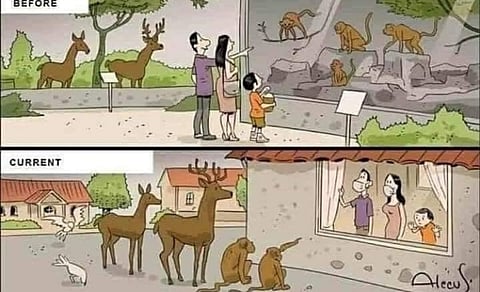With humans under lockdown, Mother Nature slowly heals itself
A Correspondent
Numaligarh: As the novel coronavirus pandemic continues to claim more lives around the world, a majority of the global population has been advised to remain indoors and maintain social distancing to avoid contracting COVID-19. Ever since the coronavirus outbreak started, global air pollution has come down with fewer industries or factories functioning and fewer cars and people on roads. Dense human populated areas are slowly being reclaimed by nature. In most parts of the world and in India, wild animals are roaming more freely as humans are staying at home due to the lockdown. Assam has also witnessed a number of incidents where wild animals were sighted in dense human populated areas. Even some rare wild species were also reported roaming in places with no past history of being sighted in those places.
On March 26, two leopards were seen roaming in two different villages in Golaghat district in broad daylight. Cases of injuries were also reported in both the places where the villagers went out and engaged in hunting amidst of the lockdowns. Acting on the mounting pressure by locals, the forest department set up a cage and succeeded to cage one leopard which was later released in a nearby reserve forest. On the same day, a herd of wild elephants was also reported to roaming around in a place near Dhemaji town. One local of the town stated that probably it was the first time a wild elephant herd visited Dhemaji town.
Dr Bibhab Talukdar, CEO of Aaranyak, said, “Wild animals are born free. During ongoing lockdown, animals are using their freedom to move freely in their existing or past habitats as people are now confined to their homes. Ecological balance is essential for human beings to live. We need to differentiate well between our needs and our greed. We need to reduce our negative action against Mother Earth so that we don’t create new environmental challenges that could jeopardize our living in this planet.”
“Similarly, a large flock of Lesser Whistling Ducks or Whistling Teal was spotted at Dighalipukhuri Lake on March 26 and March 27 in the heart of Guwahati city. Probably it happened due to the fact that we have left natural entities alone for the first time due to the lockdown,” he added.
Wildlife Conservationist and Honorary Wildlife Warden of Guwahati, Kaushik Baruah said, “The lockdown has brought about a calmness which has led to an increase in visibility of certain non-human species in urban and sub-urban environments. This proves that given a chance, things can heal on their own. But at the same time, we shouldn’t assume that non-human species are reclaiming what is rightfully theirs.”
There are plenty of reports across Assam where wild animals are roaming in urban and sub-urban areas with less number of human presence in the environment.
It has been almost a week since a large herd of pachyderms is roaming around villages near Numaligarh in Golaghat district. A villager, Budhe Bhuyan of nearby Bukhial tea garden lost his life in a close encounter with a wild elephant during evening hours on April 10. It is usual to have these pachyderms roaming in the paddy fields during the crop harvesting season. But with no rice or its seedlings in the fields, why are these pachyderms coming out from their habitats in nearby reserve forests?
Wildlife expert and zoology professor Dr Rajeev Basumatary said, “Biodiversity acts as a protective layer to prevent the spread of diseases from animals to humans. A healthy ecosystem where our guests, the birds, and mammals, live together in total harmony, will provide us a better environment with no room for the spread of diseases. It is high time that we re-set the lost equation among the living beings and bring back the diseased earth back to its state of harmony and peace.” He further said, “It is the nesting season for turtles and with less number of human presence and disturbance, we are expecting to get better hatchlings results this year.” Statistics say, for every thousand hatchlings, only a few reaches adulthood due to natural and manmade causes.
Wildlife Conservationist and Former Honorary Wildlife Warden of Golaghat, Arup Ballav Goswami said, “At least a few days during lockdown is a great chance for nature. The ecosystem started flourishing with the lockdown announced by the Government of India. There is a drastic reduction in vehicular emission and industrial operations have come to a halt. With no human interactions to spoil nature, there is a resultant improvement in the air quality. The air is much healthier than before. It will be most appropriate to declare Janta Curfew on April 22 every year, which is Earth Day. It will be a day when we shut down all human activity, a day free of vehicular movement and industrial production as a sign of our respectful salute to nature, a day to appreciate the old values and simpler things in life, a day to enjoy the silence and clean air, and a day to declare our solidarity with all living creatures, respecting their right for co-habitation and co-existence with us humans.”

